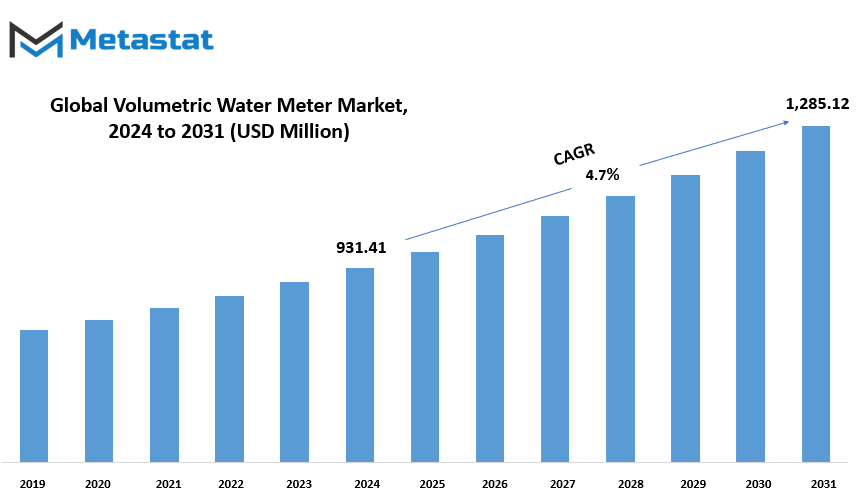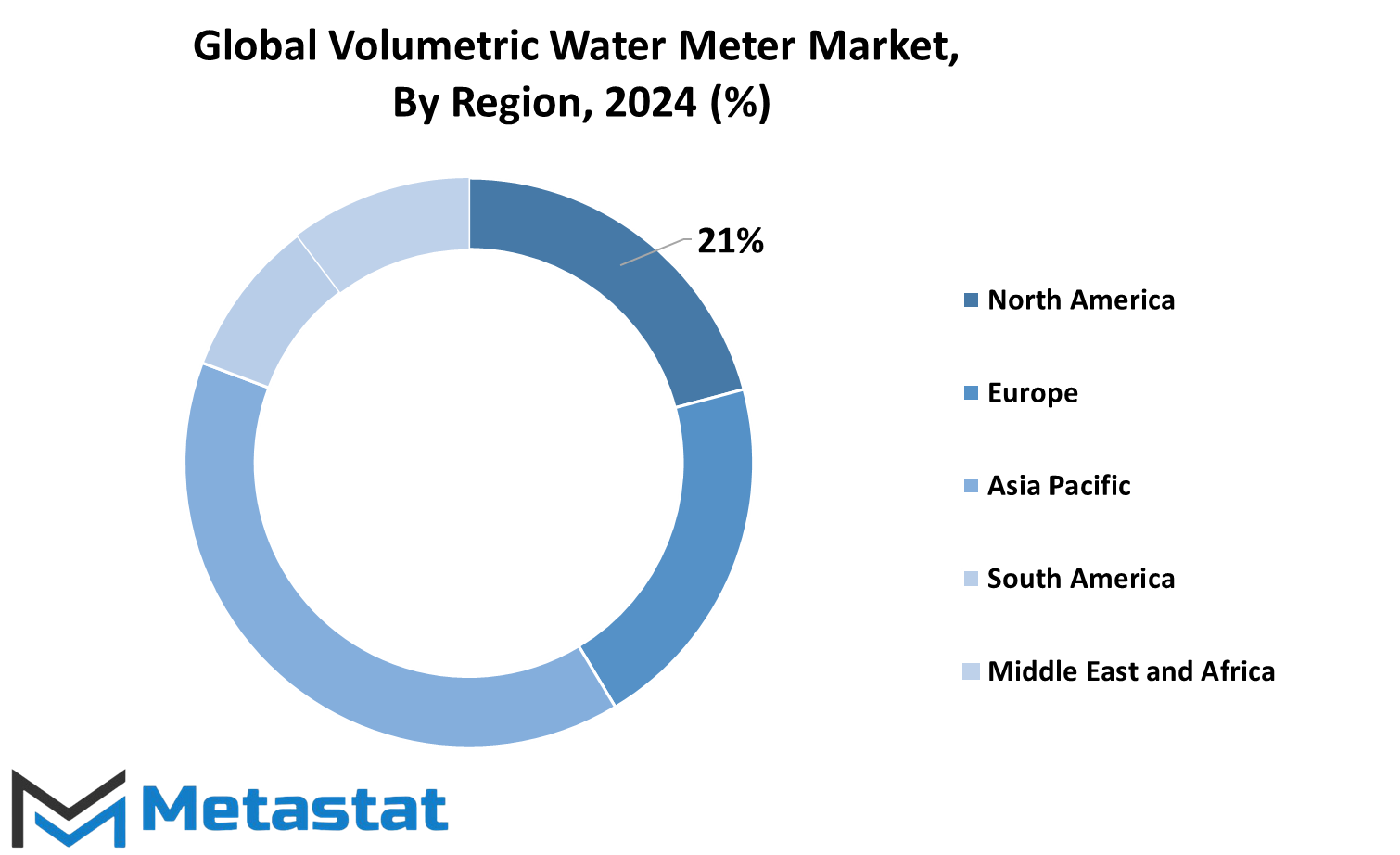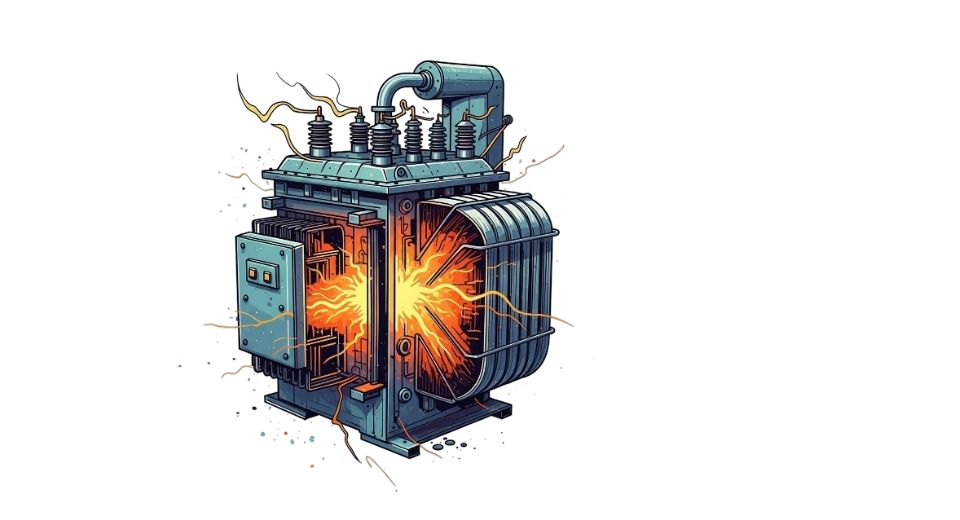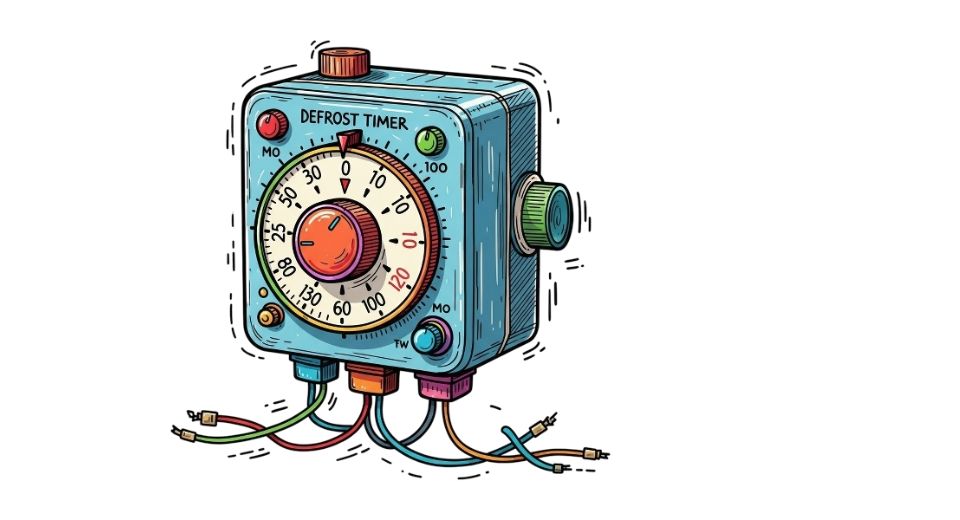MARKET OVERVIEW
The Global Volumetric Water Meter market will undergo great changes because of continuous shift in demand toward precision, efficiency, and innovation in the water utility sector. It is an industry dedicated to providing a precise measure of water usage that helps manage resources, ensuring proper allocation. Reliability in providing usage data from volumetric water meters helps utilities maximize their services to consumers and keeps consumers abreast of their own consumption.
The increase in urbanization and large populations are forcing cities to require more mature water management systems. Global Volumetric Water Meter will be at the front line of this change, promising improved accuracy and efficiency of consumption tracking. Unlike the traditional mechanical meters, volumetric meters measure the volume of water consumed over time. This makes their readings more accurate, with reduced errors and the provision of data that can be used to modify service rates or detect leaks. With digital technologies embedded within these meters, such devices will play a key role in streamlining the administration of water systems in the near future.
The next step will likely be the acceptance of more integrated, smart metering solutions, which will become a part of the digital transformation of water infrastructure. Smart meters that capture real-time data and then transmit it over wireless networks will most likely become standard. These offer a higher granularity of data for both consumers and utilities to keep track of the usage of water with unmatched accuracy. They also enhance operational efficiencies by enabling remote monitoring, thus reducing the need for manual meter readings. This technology is not only beneficial for utilities but also empowers consumers to manage their consumption more responsibly, potentially driving down water waste.
Another significant change in the industry will be interoperability. Future trends in the Global Volumetric Water Meter market indicate that water meters will be part of larger smart grid systems, where they will interact with other infrastructure components such as pressure sensors and leak detectors. This will allow utilities to predict usage patterns, address potential problems before they escalate, and optimize water distribution networks.
A thrust towards sustainability would further define the market's development. As scarcity of water has become a problem in most countries, the urgency to manage this resource will keep increasing. In terms of volumetric meters, because they provide point-to-point data on consumption, they will provide the basis for more efficient use of water resources. Utilities, for instance, will use these data to guarantee a more sustainable use of this resource, focusing on areas in which conservation can be implemented.
In addition, increasing standards of water usage conservation by governments and regulatory authorities, volumetric meters will have to be used in not only measuring the water usages but also going beyond mere measurement to act as useful compliance with environmental regulations. Utilities will have to report their operations in line with legal requirements, which is highly likely to increase as water conservation is highly regulated. Market for Global Volumetric Water Meter will keep rushing in such a highly managed scenario.
In conclusion, the Global Volumetric Water Meter market will change profoundly in the coming years with technological advancement and the increasing demand for sustainability. As this market evolves, it will not only support the water utilities but also contribute to a broader societal goal of conserving precious water resources. With innovation at its core, the industry will play a key role in addressing future challenges related to water distribution, conservation, and management.
Global Volumetric Water Meter market is estimated to reach $1,285.12 Million by 2031; growing at a CAGR of 4.7% from 2024 to 2031.

GROWTH FACTORS
There are several important factors contributing to the growth of the global volumetric water meter market. One is the rising attention towards water conservation. Communities and industries, realizing the need to save water, require water usage to be measured accurately. A precise means of tracking consumption is offered by volumetric water meters, making them an important component in water management.
Fast growth and continuous infrastructural development characterize urbanization, making it the reason for rising volumetric water meters demand. Due to expanding cities and more structures, an urban area would always require some method of proper management of this life-giving substance. It also happens to be a part of urban plans to ensure an appropriate use of the available resource due to heavy demands in water-consumed places.
Despite the growing demand, volumetric water meters have a number of challenges to be overcome before they can be widely used. The major challenge is the high installation costs. For residential and commercial users, the initial investment needed to install these meters can be a significant barrier. For some, the costs involved outweigh the long-term savings on water usage, which may limit the growth of the market in certain regions.
Some volumetric models of water meters also have specific technological limitations because they are applied in measuring variable conditions of flow. For example, temperature variability, pressure difference, or any other change affecting the quality can alter the measuring accuracy. Such an aspect may diminish the reliability level of some of these systems; hence, a fluctuating level of water conditions will discourage their acceptance.
On the bright side, there is an emerging trend towards smart metering and IoT integration. Enhanced precision, real-time monitoring, and especially data analysis make these advanced meters very attractive both for consumers and utility companies alike. Indeed, demand for smart water meters is escalating, which should positively impact the market for volumetric water meters as these innovative solutions increase in popularity. In the subsequent years, advanced technological development integrated into IoT may hold great and more profitable options for the volumetric water market that can look toward addressing and covering current voids in improving water meter services across all lines of operation.
MARKET SEGMENTATION
By Product Type
The Global Volumetric Water Meter market will grow and expand largely in the future. An important part of this market is the segmentation by type of product, as there are various types of water meters that are needed for the accurate measurement of water consumption. Among those water meter types identified above, two categories are of significant concern: Rotary Piston Water Meters and Oscillating Piston Water Meters, accounting for a market size of $317.99 million.
Rotary Piston Water Meters work on the principle of water flow measurement with a rotating piston that moves with the pressure exerted by water. These meters are known for their accuracy and reliability in delivering accurate readings over time. They are used in residential, commercial, and industrial areas where consistent monitoring of water usage is crucial. The increased use of these meters across the globe is driven by the growing demand for accurate water measurement systems.
The other type of piston meter is Oscillating Piston Water Meters. Here, an oscillating piston reciprocates during the flow of water. It is measured by this reciprocating motion and used to measure the volume of water consumed. They are used for their performance under varying pressure levels in environments. They find application in small commercial and residential sectors. Their durability and capability to withstand rough environmental conditions have made them the demand of the times for long-term water usage monitoring at a reasonable cost.
The two types of volumetric water meters are leading the development of the water metering industry. These products continue to evolve to meet the needs of consumers and businesses alike as demand for water management solutions increases worldwide. The market value of $317.99 million indicates the importance of these two types of meters and the continued need for efficient tracking systems for water usage. The growth in this sector is driven not only by technological advancements in water metering devices but also by the growing awareness of the importance of sustainable water management as global water demand continues to increase.
In summary, segmentation of the Global Volumetric Water Meter market into Rotary Piston and Oscillating Piston Water Meters outlines the significance that these technologies possess in managing consumption of water. Industries and houses would continue to apply such meters so much that water consumption will begin to be observed and reduced more significantly.
By Technology
Global Volumetric Water Meter can be divided in technology into the following two: Mechanical Water Meters and Smart Water Meters. These categories mainly influence water consumption measuring and control at different industry sites and at household levels.
Mechanical Water Meters were among the early products used over long periods; the simplicity of such meters also reflects their high level of reliability. The water volume in these meters is usually measured mechanically, where the rotating element of the meter is moved by water flow. This movement is translated into a reading that indicates the amount of water consumed. Even though mechanical water meters have been around for so long, they have their weaknesses. They need periodical maintenance. In addition, mechanical meters show wear and tear, which often affects the results over time. Also, in mechanical meters, real-time information is not acquired, which leads to inefficient tracking of consumption.
Smart Water Meters are becoming the favorite due to their advanced technology and ability to give more precise data. These meters employ digital technology to record and transmit water usages in real time, which has many advantages compared to old mechanical ones. Smart meters will be able to automatically deliver data to utilities, making manual reading unnecessary and increasing its accuracy. And they can be designed to notice a leak or irregularity, thus helping prevent wastage in water. In addition, they offer users detailed insights into their water usage, enabling them to change their habits and save water. This technology is particularly useful in modern smart homes and businesses that value sustainability and energy efficiency.
The shift towards Smart Water Meters reflects a wider trend of putting advanced technology into everyday infrastructure. Since water management becomes increasingly important in light of increased concerns over the conservation and efficiency of water, smart solutions are in high demand. With Smart Water Meters, users and utilities alike can make informed decisions that will lead to better water management practices and, ultimately, to a more sustainable future.
Two crucial submarkets of water meters are Mechanical Water Meters and Smart Water Meters. The market of the future would most likely belong to Smart Water Meters since their development offers several benefits, not only in convenience, accuracy, and environmental sustainability, but will dominate the technological future of such markets.
By Application
The volumetric water meters market is growing across the globe in several sectors. By application, the market is classified into three major heads: residential, commercial, and industrial. All these are vital segments that form the nucleus of the overall demand for volumetric water meters. Overall, the measurement of and management of water consumption rely heavily on volumetric water meters.
Volumetric water meters are mainly applied in households in the residential sector for the measurement of water used and billing purposes. As urbanization increases and so does the need for water, efficient management of water systems becomes a crucial requirement. Therefore, the need for accurate reading of water meters is increasing for proper billing and the monitoring of the usage of water by the consumer. In many regions, governments and utilities are encouraging the use of smart water meters in order to maximize efficiency, further driving volumetric water meters for residential use.
The commercial market also offers an important share of the volumetric water meters. Here, both private enterprise and public organizations in the sector utilize volumetric measurements for water used to support daily operations and costs. For offices, schools, and shopping malls, commercial businesses need reliable water meters to track their water consumption and avoid waste. As the importance of sustainability increases in business, companies seek more ways to implement water-saving strategies. Environmental responsibility is part of this growth that volumetric water meters enjoy in commercial applications.
In the industrial sector, the demand for volumetric water meters is driven by the need for large-scale water management systems. In manufacturing, agriculture, and energy sectors, it is necessary to measure water consumption precisely to be efficient, waste-free, and in compliance with regulations. Industrial water meters monitor consumption, prevent overuse, and support sustainability. As water scarcity challenges continue to be faced by industries, the adoption of water-efficient technologies, such as volumetric water meters, is on the rise.
The global volumetric water meter market is likely to grow as demand increases in residential, commercial, and industrial applications. With water conservation becoming a priority globally, the market for these meters will likely expand, driven by the need for accurate and efficient water management solutions.
|
Report Coverage |
Details |
|
Forecast Period |
2024-2031 |
|
Market Size in 2024 |
$931.41 million |
|
Market Size by 2031 |
$1,285.12 Million |
|
Growth Rate from 2024 to 2031 |
4.7% |
|
Base Year |
2022 |
|
Regions Covered |
North America, Europe, Asia-Pacific Green, South America, Middle East & Africa |
REGIONAL ANALYSIS
The Volumetric Water Meter market by geography is divided into five major regions: North America, Europe, Asia-Pacific, South America, and the Middle East & Africa. The regions are classified into specific subdivisions that further facilitate the identification of trends in the market and opportunities for expansion.
The three major countries in North America are broken down within the market. This segmentation allows the market to be analyzed at the country level, which means that businesses understand the local demand, regulatory standards, and other factors that could affect the water meter industry. For example, the United States is one of the biggest consumers of water meters, with extensive water infrastructure; Canada and Mexico are up-and-coming markets with their specific needs and challenges.
The next region of importance in the global Volumetric Water Meter market is Europe. Some of its prominent nations are the United Kingdom, Germany, France, and Italy. Though not only important in terms of size but also pivotal for new technologies in water metering in their respective development and adoption. The rest of Europe includes various smaller countries that are also contributing to the growth of this market. By understanding the demand and supply trends in these regions, manufacturers and suppliers can tailor their products and services to fit specific regional needs.
In Asia-Pacific, the market is segmented into key countries such as India, China, Japan, and South Korea, with the remaining countries grouped under the "Rest of Asia-Pacific" category. Asia-Pacific hosts some of the world's most rapidly growing economies, and thus, the demand for water meters will increase substantially in these regions as a result of rapid urbanization, industrialization, and a need for effective water management solutions. China and India, with their large and diverse markets, require a wide variety of water metering solutions to support their ever-growing populations and expanding infrastructures.
While small relative to the whole, the South American market has its importance: Brazil and Argentina are the prominent countries that spearhead the demand of volumetric water meters. There are other smaller countries in this region that form the rest, which are adopting water management systems gradually, both within the public sector and private.
Last but not least, the Middle East & Africa region that comprises GCC countries, Egypt, South Africa, and the rest of the region represents a great market for water meters. The region faces specific issues like water shortage and extreme climate, which creates pressure for innovative and efficient solutions in water metering.
By segmenting the global Volumetric Water Meter market into such geographic areas, the companies and interested parties would have a better view of the dynamics, opportunities in those markets, and factors affecting the demand.

COMPETITIVE PLAYERS
The Volumetric Water Meter market is becoming increasingly important in today's world as water usage and management are becoming more critical. This market has grown due to the need for accurate water measurement devices, and several key players have significantly contributed to its development. Among the industry's top companies are Diehl Metering, Hebei Shanghong Water Meters Technology Co., Ltd., and Sensus (Xylem), which play an important role in providing the latest water metering solutions. Itron is also not a slouch in innovation, with some recent advancements in smart metering solutions that target better water management and minimal wastage. Arad Group, being established for leveraging technology at its best, is a good competitor here as well - both in mechanical and smart meters to the various sectors. Iskraemeco Group has developed significantly in the areas of water metering - high-quality and reliable meters.
The Elster Group, which is part of Honeywell, has also played a prominent role in water metering solution development. The product lines offered by this group have been applied across residential and commercial lines, giving an accurate measurement and improved resource management. Another important group, Apator, is renowned for its contemporary systems of metering that bring much efficiency in water distribution systems.
Other prominent companies in the market include Zenner International, which focuses on high-performance water meters, known for applications in residential, industrial, and municipal areas.
WENLING YOUNIO WATER METER CO., LTD. And Ningbo Water Meter (Group) Co., Ltd. are renowned for their low cost but still durable water metering products across the globe. As such, Maddalena S.p.A. remains focused on accuracy for precise water meters, whereas Komachine Inc. specializes in merging technology with innovation within water-measuring devices. There are several similar players in the Volumetric Water Meter market as well who contribute towards a rise in improving accuracy of measurement in water and their sustainability in nature and efficient processes.
The contributions of these players will shape the future of the market as demand for smarter and more reliable water metering systems continues to grow. Their continued research and development make sure that water metering technology evolves according to the growing needs of urbanization and resource management, therefore offering solutions that could effectively cater to both current and future demands. With increasing global concerns about water conservation, these companies will remain vital in offering products that contribute to sustainable water use worldwide.
Volumetric Water Meter Market Key Segments:
By Product Type
- Rotary Piston Water Meters
- Oscillating Piston Water Meters
By Technology
- Mechanical Water Meters
- Smart Water Meters
By Application
- Residential
- Commercial
- Industrial
Key Global Volumetric Water Meter Industry Players
- Diehl Metering
- Hebei Shanghong Water Meters Technology Co.,Ltd
- Sensus (Xylem)
- Itron
- Arad Group
- Iskraemeco Group
- Elster Group (Honeywell)
- Apator Group
- Zenner International
- WENLING YOUNIO WATER METER CO., LTD
- Ningbo Water Meter (Group) Co., Ltd.
- Maddalena S.p.A.
- Komachine Inc.
WHAT REPORT PROVIDES
- Full in-depth analysis of the parent Industry
- Important changes in market and its dynamics
- Segmentation details of the market
- Former, on-going, and projected market analysis in terms of volume and value
- Assessment of niche industry developments
- Market share analysis
- Key strategies of major players
- Emerging segments and regional growth potential








 US: +1 3023308252
US: +1 3023308252






